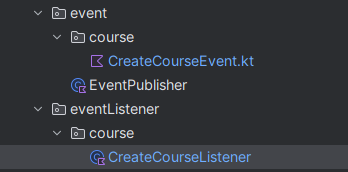Event
package com.kotlinspring.event import com.kotlinspring.dto.CourseDTO import org.springframework.context.ApplicationEvent data class CreateCourseEvent(private val args: CourseDTO) : ApplicationEvent(args)
Event Publisher
package com.kotlinspring.event import org.springframework.context.ApplicationEvent import org.springframework.context.ApplicationEventPublisher import org.springframework.context.ApplicationEventPublisherAware import org.springframework.stereotype.Service @Service class EventPublisher : ApplicationEventPublisherAware { lateinit var eventPublisher: ApplicationEventPublisher fun publishEvent(event: ApplicationEvent) { eventPublisher.publishEvent(event) } override fun setApplicationEventPublisher(applicationEventPublisher: ApplicationEventPublisher) { this.eventPublisher = applicationEventPublisher } }
Event Receiver
@Service class CourseService( val db: DSLContext, val courseRepository: CourseRepository ) { companion object { var logger: KLogger = KotlinLogging.logger {} } ... @EventListener fun handleCourseCreatedEvent(event: CreateCourseEvent) { val source = event.source as? CourseDTO println("This is the source of handleCourseCreatedEvent $source") } ... }
Await for Events' Completion Using CountDownLatch
In case we need to wait for the event to be consumed completely and give response to the user.
In the sequel we start to organize files in such a way that every developer can understand what is happening easily:

Let's take addCourse as an example, we will be:
- dispatching an event
CreateCourseEvent - waiting for that event to complete with the hlep of
CountDownLatch - get the latest result by the
callbackwe passed as a trailing closure:{ dbResult: Course? -> savedResult = dbResult }
@RestController @RequestMapping("/v1") class CourseController( val courseService: CourseService, val eventPublisher: EventPublisher ) { @PostMapping @ResponseStatus(HttpStatus.CREATED) @RequestMapping("/courses") fun addCourse(@RequestBody courseDTO: CourseDTO): Course? { val latch = CountDownLatch(1) var savedResult: Course? = Course() val createCoursePayload = CreateCoursePayload( courseDTO, latch ) { dbResult: Course? -> savedResult = dbResult } val createCourseEvent = CreateCourseEvent(createCoursePayload) eventPublisher.publishEvent(createCourseEvent) latch.await() println("latch.await() unlocked!") return savedResult } }
Here
data class CreateCoursePayload( val courseDTO: CourseDTO, val latch: CountDownLatch, val resultCallback: ((savedResult: Course?) -> Unit)? ) data class CreateCourseEvent(private val args: CreateCoursePayload) : ApplicationEvent(args)
and
@Order(1) @Component class CreateCourseListener( private val courseService: CourseService ) : ApplicationListener<CreateCourseEvent> { override fun onApplicationEvent(event: CreateCourseEvent) { val payload = event.source as CreateCoursePayload val courseDTO = payload.courseDTO val latch = payload.latch val updateCallback = payload.updateCallback try { val savedCourse = courseService.addCourse(courseDTO) updateCallback?.invoke(savedCourse) println("Saving Course is Done!") } catch (e: Exception) { throw e } finally { latch.countDown() } } }
Here we have annotated our EventListener by @Order(1), which indicates the priority of order handling the same event.
In case we need to handle the event by different listeners sequentially, we use @Order(1), Order(2), ....